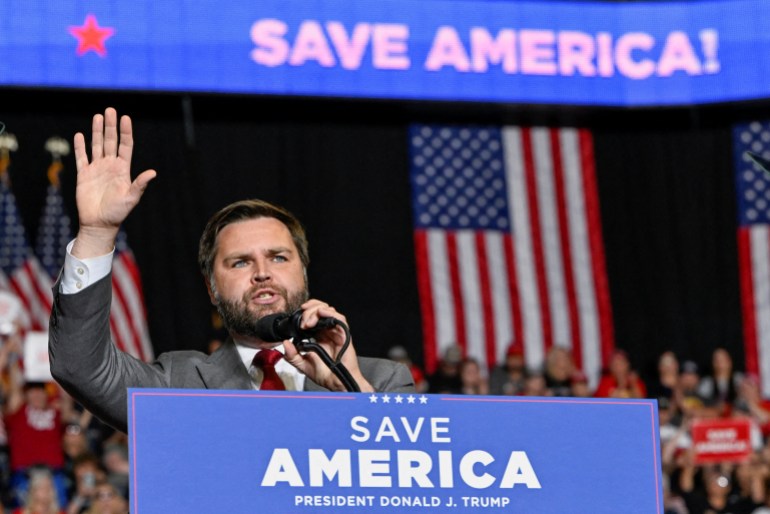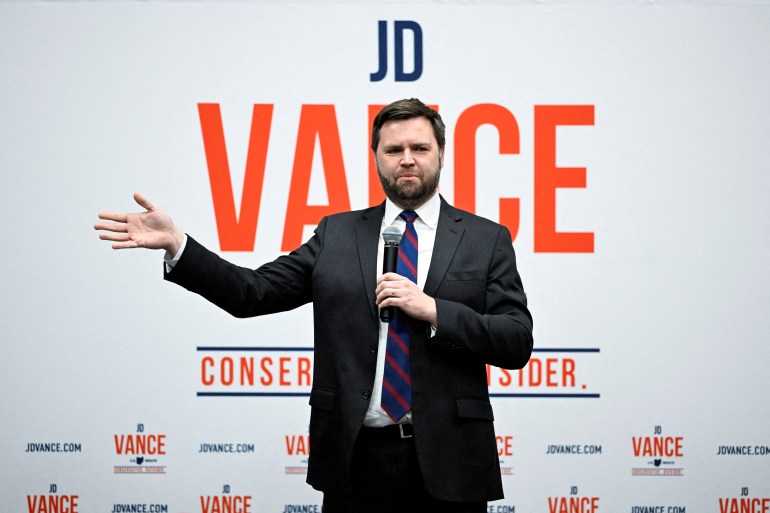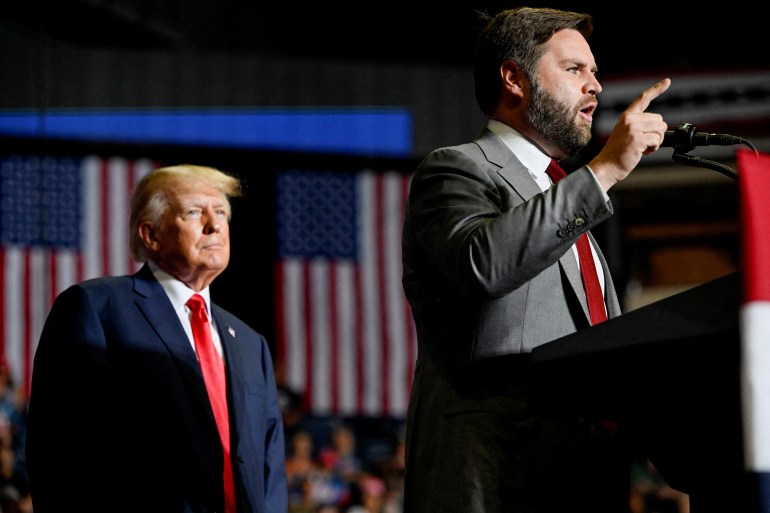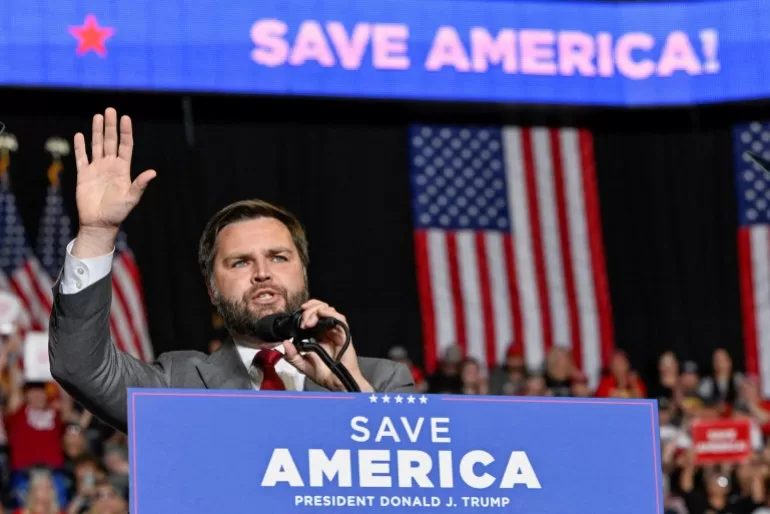The question had lingered over Donald Trump’s presidential campaign for months: Who will the Republican pick as his running mate as he pursues a second term in the White House?
On Monday, his choice was revealed: JD Vance, an author, venture capitalist and pugnacious first-term senator from Ohio.
Experts say the decision marked a shift in strategy for Trump. While Trump’s previous running mate, Mike Pence, was seen as a moderating influence in his campaign, his new selection signals an embrace of hard-right “Make America Great Again” politics — and a break from the old-school Republican establishment.
Allan Lichtman, a professor of US history at American University, told Al Jazeera that Vance will likely not appeal to swing-state voters or those sceptical of Trump’s brand of politics.
“I don’t think the pick of JD Vance one way or another is going to affect the outcome of this election. But it says a lot about the Republican Party and Donald Trump,” Lichtman said.
He pointed out that Trump could have courted middle-ground voters by choosing someone akin to Nikki Haley, his rival in the Republican primaries.
“Trump didn’t reach out to the small but not insignificant faction of his party that supported Nikki Haley, who has a different approach to foreign policy and a more moderate approach to domestic policy,” Lichtman explained. “Instead, he picked a younger clone of himself.”

The zeal of a convert
Vance was not always so closely aligned with Trump. In the past, Vance described himself as a “Never Trump guy” and even called the former president “reprehensible” and “an idiot”.
In a 2016 screenshot widely shared on social media, Vance even told a friend he could not decide whether Trump was a “cynical a**hole” or “America’s Hitler”.
But when Vance ran for his Senate seat in 2022, his tone switched: He leaned into Trump’s style of politics, repeating false claims that the 2020 election had been stolen through massive fraud.
Ultimately, he won the former president’s endorsement, a widely coveted stamp of approval among Republican political hopefuls.
Media reports indicate Trump himself was impressed with Vance’s public persona — and his willingness to defend the ex-president in his regular media appearances.
Even after Vance won his Senate seat, he continued to praise Trump and attack his critics.
Trump-endorsed candidates performed poorly overall in the 2022 midterm races, and some in the Republican Party openly questioned whether Trump was an electoral liability. Vance, however, doubled down on his support, penning articles with titles like “Don’t Blame Trump”.
Nevertheless, Lichtman said Vance’s background as a Trump critic could still serve as a liability.
“Obviously Trump is going to say, ‘My policies and my leadership have been so great when I was president that I’ve converted my strongest critics, including JD Vance,’” Lichtman explained.
“On the other hand, you might see Democrats, in commercials and debates, repeat the horrible things JD Vance has said about Donald Trump.”

An appeal to the working poor
Just as Trump’s presidential run in 2016 prompted questions about the future of the Republican Party, Vance’s place on the 2024 ticket has sparked debate about whether conservatives are moving away from previous longstanding positions.
Vance is the author of the 2016 memoir Hillbilly Elegy, which traces his experiences growing up in Ohio with a family from rural Kentucky. The book revolves around themes of social and economic alienation among the working poor.
While old-school Republicans have long expressed support for free trade and corporate deregulation, Vance himself has railed against the free-trade deals that led to the decline of industry in areas like the Rust Belt, where Ohio is located.
While Trump’s Democratic rival, Joe Biden, is likewise from the Rust Belt town of Scranton, Pennsylvania, Vance has said Trump’s values better align with the region.
“The guy who actually connects with working people in this country is not fake Scranton Joe. It’s real President Donald Trump,” Vance said in recent remarks to party donors.
Still, Vance’s critics question his working-class bona fides: The vice presidential nominee attended Yale Law School and has close ties to right-wing billionaires from his time in the tech sector.
They also point out that, during his time in the Senate, Vance was reluctant to sign on to pro-labour legislation.

A new direction on foreign policy?
Vance has also shown a willingness to break with party orthodoxy in foreign policy, moving away from full-throated support for US military action overseas.
Trump himself has expressed similar sentiments, pushing an “America First” policy.
Those schisms over foreign policy were on display during the Republican Party primary, with candidates like Haley staking out more traditional positions, in favour of international alliances like NATO and military assistance for countries like Ukraine.
For his part, Vance has been hawkish in his opposition to China and support for Israel. He has also advocated using the US military to target drug trafficking in Mexico. But when it comes to Ukraine, which has been fending off a full-scale Russian invasion since 2022, he was less enthusiastic.
“I do not think that it is in America’s interest to continue to fund an effectively never-ending war in Ukraine,” he said in May.
“I do not think that it is in America’s interest to continue to fund an effectively never-ending war in Ukraine,” he said in May.
But David Klion, an author working on a book about neoconservatives, said events such as the Iraq War helped create the current trend.
Recent US-led wars in the Middle East have been a source of discontent with previous Republican leaders like George W Bush.
Klion explained that those conflicts have led many in the party to grow increasingly wary of US commitments overseas.
“The discrediting of this more traditional type of conservatism is rooted in the catastrophes of the Iraq and Afghanistan wars,” Klion told Al Jazeera.
“The Vance selection is an ideological statement. When Trump picked Mike Pence to be his vice president in 2016, it was a pick meant to reassure those in the party who were spooked by Trump that he wouldn’t stray too far from the party’s norms on issues like trade and foreign policy,” he added.
“Vance is clearly meant to signify that the right, as it has developed in the wake of Trump’s election, is the direction Trump wants to lead the party.”
